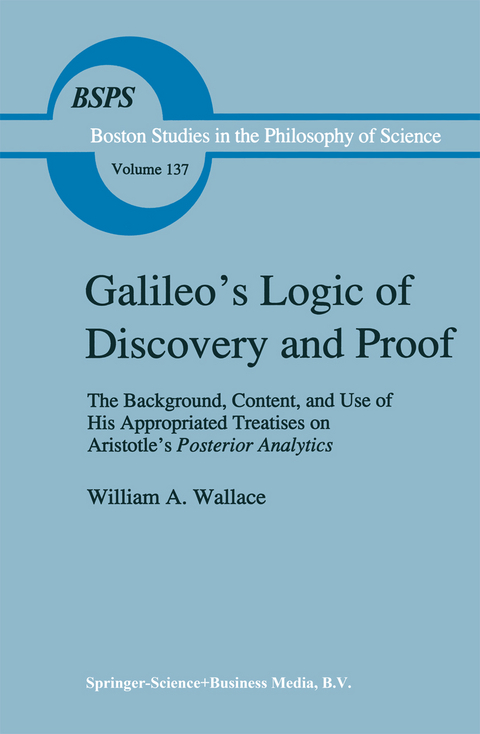
Galileo’s Logic of Discovery and Proof
The Background, Content, and Use of His Appropriated Treatises on Aristotle’s Posterior Analytics
Seiten
2011
|
Softcover reprint of the original 1st ed. 1992
Springer (Verlag)
978-90-481-4115-9 (ISBN)
Springer (Verlag)
978-90-481-4115-9 (ISBN)
This volume is presented as a companion study to my translation of Galileo's MS 27, Galileo's Logical Treatises, which contains Galileo's appropriated questions on Aristotle's Posterior Analytics - a work only recently transcribed from the Latin autograph. Its purpose is to acquaint an English-reading audience with the teaching in those treatises. This is basically a sixteenth-century logic of discovery and of proof about which little is known in the present day, yet one that arguably guided the most significant research program of the seventeenth century. Despite its historical and systematic importance, the teaching is difficult to explain to the modern reader. Part of the problem stems from the fragmentary nature of the manuscript in which it is preserved, part from the contents of the teaching itself, which requires a considerable propadeutic for its comprehension. A word of explanation is thus required to set out the structure of the volume and to detail the editorial decisions that underlie its organization. Two major manuscript studies have advanced the cause of scholarship on Galileo within the past two decades. The first relates to Galileo's experimental activity at Padua prior to his discoveries with the telescope that led to the publication of his Sidereus nuncius in 1610. Much of this activity has been uncovered by Stillman Drake in analyses of manuscript fragments associated with the composition of Galileo's Two New Sciences, fragments now bound in a codex identified as MS 72 in the collection of Galileiana at the Biblioteca Nazionale Centrale in Florence.
1. Galileo’s Logical Methodology.- 1. Method, Logic, and Science.- 2. Assessments of Galileo’s Methodology.- 3. Method in the Greek and Latin Traditions.- 4. The Setting for Galileo’s Methodological Terminology.- 5. Logica Docens and Logica Utens.- Notes.- Logica Docens.- 2: The Understanding of Logic Implicit in Ms 27.- 3: Science and Opinion as Understood in Ms 27.- 4: Demonstration and Its Requirements in Ms 27.- Logica Utens.- 5: Galileo’s Search for a New Science of the Heavens.- 6: Galileo’s New Sciences of Mechanics and Local Motion.- Epilogue.- Concordance of English and Latin Editions.- Index of Terms.- Index of Names.
| Reihe/Serie | Boston Studies in the Philosophy of Science ; 137 |
|---|---|
| Zusatzinfo | XXIII, 333 p. |
| Verlagsort | Dordrecht |
| Sprache | englisch |
| Maße | 152 x 229 mm |
| Themenwelt | Geisteswissenschaften ► Geschichte |
| Geisteswissenschaften ► Philosophie ► Allgemeines / Lexika | |
| Geisteswissenschaften ► Philosophie ► Logik | |
| Naturwissenschaften ► Physik / Astronomie ► Astronomie / Astrophysik | |
| ISBN-10 | 90-481-4115-X / 904814115X |
| ISBN-13 | 978-90-481-4115-9 / 9789048141159 |
| Zustand | Neuware |
| Informationen gemäß Produktsicherheitsverordnung (GPSR) | |
| Haben Sie eine Frage zum Produkt? |
Mehr entdecken
aus dem Bereich
aus dem Bereich
die letzten Jahre der Philosophie und der Beginn einer neuen …
Buch | Hardcover (2024)
Klett-Cotta (Verlag)
28,00 €
Gesundheitsschutz, Selbstbestimmungsrechte, Rechtspolitik
Buch | Softcover (2024)
Kohlhammer (Verlag)
39,00 €
Jenseits von Identität | Ausgezeichnet mit dem Leipziger Buchpreis …
Buch | Softcover (2023)
Ullstein Taschenbuch Verlag
13,99 €


